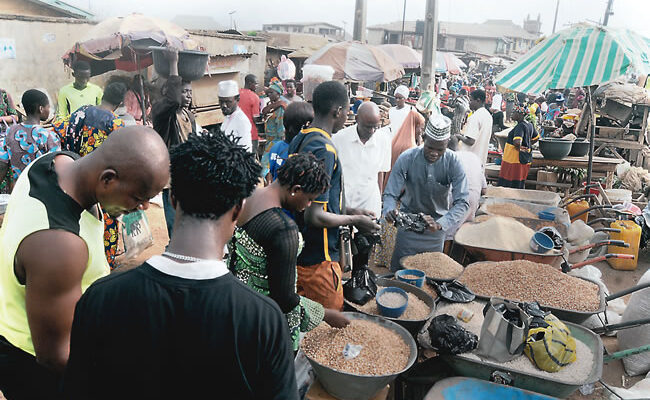

By Kingsley Alumona
There is a recent cartoon doing the rounds on social media that depicts a man who collapses and is rushed to the hospital because the N10,000 he purchased with N2,500 got lost. This scenario seemingly encapsulates the predicaments most Nigerians, especially those in the lower and middle stratification of the socio-economic class, are currently facing.
Those who frequent the markets in Ibadan , Oyo State, have one sad tale or another to tell about how the market and money dynamics have turned out in the last one month as a result of the government latest monetray policy and the attendant scarcity of the new naira notes.

Saturday Tribune spoke with traders in some markets in the city during the week on how they were coping with the cash scarcity.
“New notes, old notes, transfer…,” Saturday Tribune gathered, is now the slogan in the markets. While some traders reject the old N500 and N1,000 notes banned by the Federal Government, others take the risk of accepting them. On the other hand, while some accept bank transfers in exchange for their goods and products, some do not.
A trader at Bodija Market explained why they still accept the old notes. According to him, if a customer wants to buy goods worth N1,000 with old notes, he/she will have to add extra N500 old note, making the payment N1,500.

On how they exchange the old notes they accept from buyers for new ones, even when the Central Bank of Nigeria (CBN’s) deadline for old notes exchange has passed, the trader said that some commercial banks still accept old notes and sometimes they go to the CBN to change them.

In the various markets and shops that Saturday Tribune visited, those who do not accept fund transfers for their goods, said they did not have bank accounts since they sold petty things. Others said they were afraid that they might lose money due bad internet connectivity or inability of the bank apps to function.
“I don’t accept transfers. What am I selling?” a woman that sells vegetable, oil and other food ingredients at Bodija Market chuckled. “I don’t even have a bank account.”
“I sell only to people with cash,” a woman that sells seasoning cubes and other spices at Bodija Market said. “I don’t know anything about these transfers.”
On the other hand, there are a good number of the traders who accept bank transfers. Traders in this category make use of banks. Many of them said they preferred the mobile only banks because it is much easy for transitions on them to go through than with the commercial banks.
Ugonna Amaechi, who sells eggs in wholesale at Bodija Market, lamented that the new naira policy had brought hardship to Nigerians.
He recalled a similar government policy in 1985 during the military regime of General Muhammadu Buhari. However, he noted that then people took their old notes to the bank and they were given the new ones.
On the current policy, he said people took their old notes to the banks but there were little or no new notes in exchange.
“This government is treating us like we are nobodies, like we don’t matter. This is bad for our business,” Amaechi lamented.
He said he and other traders were trying to survive by deciding to use bank transfers but the network had been nothing to write home about. He recalled making a money transfer to someone some days ago but the person could not receive it after several days and had been disturbing him. He said he wasn’t he only one who experienced this.
“Someone did a transfer to my bank account for the goods I sold to him but I have not seen the money,” Amaechi said.
Bose Adeleke sold detergents, tomato paste and the like at Bodija Market. She said she accepted bank transfers. A woman beside her shop operated a PoS business and people who patronised Adeleke sometimes got their money through withdrawals from the PoS operator.
Adeleke admitted that since the naira scarcity began, business had been slow. According to her, only 20 per cent of people who patronised her were ready to pay in cash.
On how she managed transfers that did not immediately reflect in her account or transfers that did not succeed at all, she said “I take the phone number of the customers so that I can call to inform them if their transfers were successful or not.
Joshua Iyang, who sold herbs, seeds, roots, and other traditional medicine at Bodija Market, said since the scarcity, sales had not been good. He said people really wanted to buy things from him but there was hardly any cash to do so.
“Yes, I accept transfers, but bad network makes things difficult,” he said.
He further said that some days ago, two people bought things from him and paid through bank transfers, but the money did not immediately reflect in his account, so he collected their phone numbers to call and inform them if the transfers were successful or not.
“I’ve not seen the alerts till date,” he lamented. “I’ve been calling them and they kept telling me that network is the problem.”
A food seller around the University of Ibadan (UI), who pledged anonymity, was furious with the naira policy. She lamented poor patronage and inability of some of the bank transfers to go through.
“My body dey hot now,” she blurted out of anger.
She told Saturday Tribune that she made some transfer transitions through her First Bank account some days ago, but she was yet to see a confirmation of the transition.
“People come here to buy food, but I’m reluctant to accept bank transfers because of the ugly experience,” she said. “The network is usually bad.”
Asked what she does when people buy her food and their transfers do not immediately reflect in her bank account, she said, “They will wait until I see the alert. If I don’t see it, they won’t go with the food.”
Mary, another woman around UI, who sells bread, noodles, eggs, among others, said the naira scarcity “is a big problem” and is affecting her business. She lamented that with Nigeria, “it is one problem after another.”
She said she “manages the naira scarcity through bank transfer”, but that bad internet network “makes their transitions slower, and sometimes difficult.”
READ ALSO FROM NIGERIAN TRIBUNE









